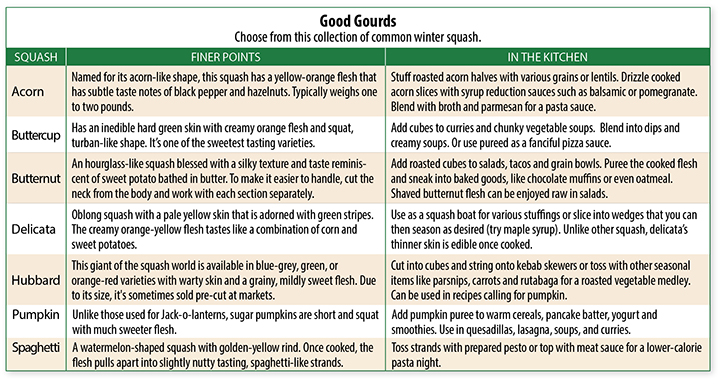Falling for Winter Squash
When sweater weather arrives, it’s time to welcome in curvy winter squash and bid adieu to all those vegetables whose peak season has long passed. From butternut to buttercup, these members of the Curcubitaceae family of vegetables are not only palate-pleasing, but also have a number of nutritional highlights worth noting.
Nutritient Bounty. Many winter squashes, particularly orange-hued butternut and pumpkin, are a leading source of beta-carotene. Once consumed, beta-carotene is converted in the body into vitamin A to help bolster immune and eye health. What’s more, a 2014 study in The Journal of Nutrition found that higher intakes of beta-carotene might benefit your heart health by helping lower levels of LDL (“bad”) cholesterol and C-reactive protein, a sign of unhealthy inflammation.
Seeds of Change
Don’t compost those squash seeds—they deliver a bonanza of nutrients, such as protein, zinc, magnesium, iron, and phosphorus. Instead, roast the seeds for a healthy out-of-hand snack, or topping for salads, soups, and granola. Toss seeds with some oil and seasonings of choice and then spread on a baking sheet. Cook in a 300°F oven for 15 minutes, or until golden and crispy.
Not to be overlooked is that winter squash can supply a healthy dose of vitamin C. A 2013 report in the Journal of the American Heart Association discovered that higher dietary intakes of vitamin C can lower risk of stroke. These benevolent cool weather vegetables also deliver potassium, that helps control blood pressure numbers and improve bone health. And you get this nutritional bounty for very little calorie cost—only about 60 calories in each one-cup serving.
Beyond nutrition, winter squash from local sources are very budget-friendly, and have laudable storage—they can stay fresh for several weeks if kept in a cool, dark location. And since they are ultra-versatile in the kitchen, you’ll have no trouble putting the gourds to good use in crowd-pleasing dishes.
—Matthew Kadey, MS, RD
The post Falling for Winter Squash appeared first on University Health News.
Read Original Article: Falling for Winter Squash »
Powered by WPeMatico


